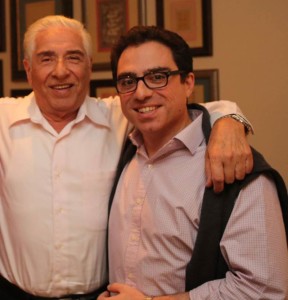July 22, 2016

A relative of the Iranian-American father and son still jailed in Iran flew to Washington this month to appeal for US assistance to win their release, saying the United States needed to take advantage of its new diplomatic rapport with Iran and perhaps propose another prisoner swap.
Siamak Namazi, 45, was arrested last October during a trip to visit his family in Tehran. His 80-year-old father, Baquer, was imprisoned in February. Authorities have yet to announce any charges against them.
Bijan Khajehpour, a former business partner of the younger Namazi and a cousin by marriage, flew from his home in Vienna to meet State Department officials and lawmakers and raise attention for their plight.
Khajehpour himself was imprisoned in 2009 for four months in Evin prison, the same place the Namazis are held.
“I’ve seen Evin myself. I know it’s not a pleasant place,” Khajehpour told reporters.
During his visit, Khajehpour also met congressmen asking for their support. The House passed a resolution last Wednesday calling for the unconditional release of the Namazis. The resolution, sponsored by Rep. Ed Royce, Republican of California, chairman of the House Foreign Affairs Committee, and Rep. Gerry Connolly, Democrat of Virginia, “urges the president, the allies of the United States, and the United Nations to raise the cases of Siamak and Baquer Namazi with officials of the Government of the Islamic Republic of Iran at every opportunity.”
A spokesman for the State Department’s Office of Iranian Affairs, Sam Werberg, told
Foreign Policy magazine the United States believes the Namazis are being held “unjustly” and should be released as soon as possible. Secretary of State John Kerry “raises the cases of detained [the Namazis] and missing [Robert Levinson] US citizens anytime he meets with Iranian officials,” Werberg said.
Khajehpour described their detention by Iran as “hostage taking,” and implored the United States to look for ways to cut a deal with Tehran that would free them.
“Right now, at least there is a channel that [they] can talk to each other,” he said. But it is unclear if that channel of communication will endure after Kerry leaves office in January, he said. “We don’t know what will happen after the change of administration.“
The Iranians should understand that their opportunity to secure potential concessions will pass once a new US president takes office next year, he argued. And the Americans could take the initiative rather than waiting for Tehran to make a proposal, he said.
“There must be something [the Americans] can offer,” he said. There could be another prisoner swap, he suggested, or Washington could remove some firms from the sanctions list or persuade some foreign banks to allow some Iranian transactions.
“There are things that are not very costly that we can offer which would probably go a long way” to breaking the impasse, he said.
After his time in jail, Khajehpour resettled with his family in Vienna, where he is a managing partner at Atieh International, a consultant firm advising companies looking to invest in Iran and other countries in the Middle East.
It is not a coincidence, according to Khajehpour, that Namazi was arrested the same day the Majlis endorsed the nuclear deal in October. To hardliners skeptical of the nuclear accord, arresting Namazi was a way of sending a signal to both their rivals inside the regime and to the Americans that they could not be sidelined, Khajehpour said.
“They are communicating to both sides,” he said. “They’re saying: ‘Don’t think you got rid of us. We’re still here. We still have power’.”
The regime is known to be holding at least seven dual nationals—the two Americans, plus two Britons, two Canadians and one French woman.
